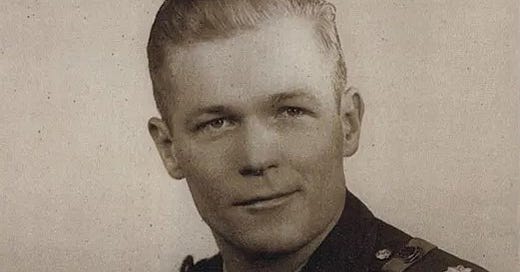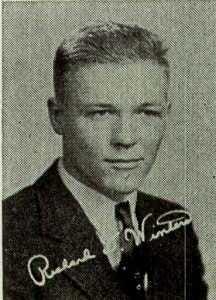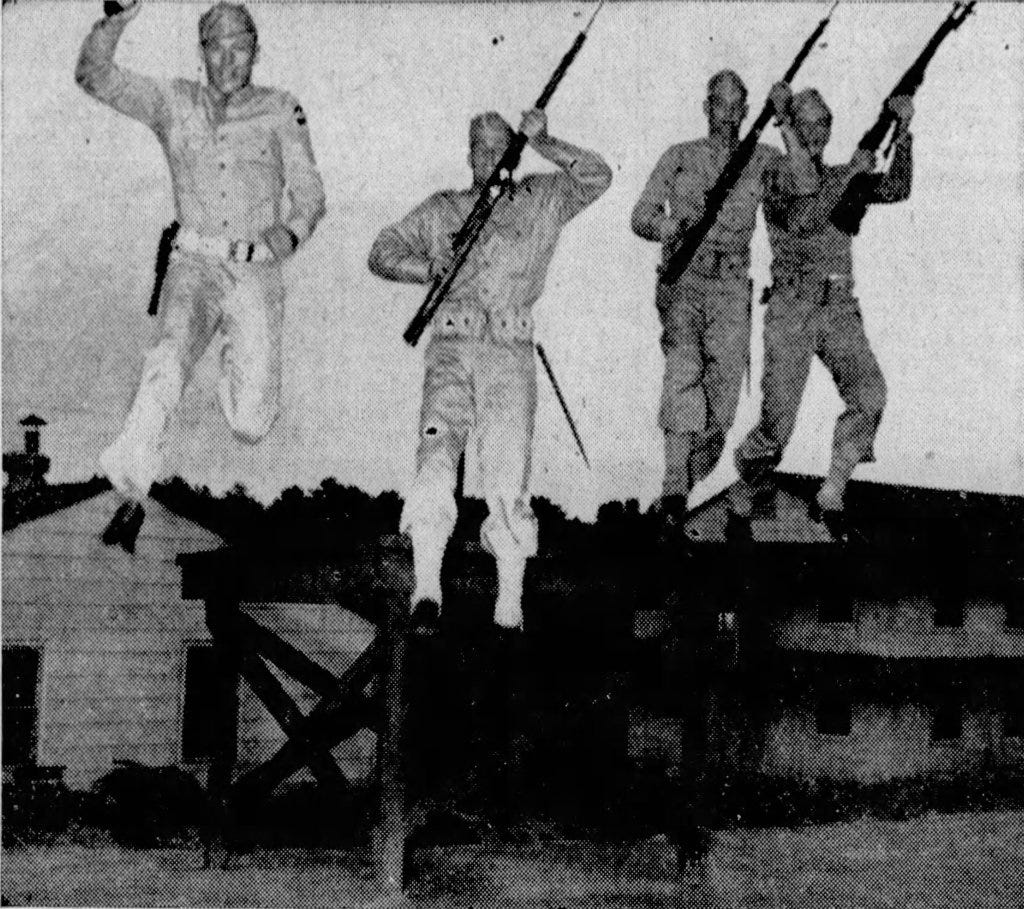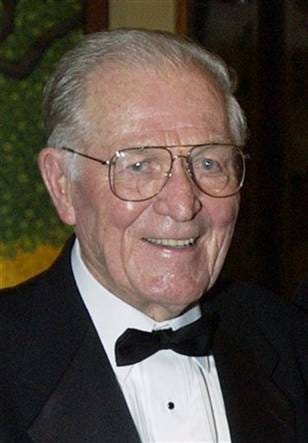Dick Winters: Before 'Band of Brothers'
Twenty years ago today, the first two episodes of Band of Brothers premiered on HBO. It’s a significant enough milestone in World War II-related pop culture history that the National WWII Museum has arranged a symposium on the miniseries and HBO has created a 12-part podcast series to reexamine the show.
I’m in the midst of rewatching the series yet again so it’s fresh in my mind as I listen to the podcast, and figured it would make sense to reshare this piece on its central character, Dick Winters, which originally ran here in January.
Who is the best-known American fighting man of World War II?
Leaving the big-name generals out of the discussion in favor of those who spent the war on the front lines, the answer to that question in the decades immediately following the war probably would have been Audie Murphy. Recipient of the Medal of Honor and every other decoration for valor, Murphy wrote a best-selling memoir and enjoyed a successful acting career in the 1950s and '60s before dying in a plane crash in 1971 at age 45.
Within the last two decades, though, that answer might very well have changed. Thanks to the everlasting impact of Band of Brothers -- more so the 2001 HBO miniseries than the 1992 Stephen F. Ambrose book on which it was based -- Dick Winters arguably has surpassed Murphy in terms of name recognition.
As the central character in the book and the miniseries (as portrayed by the British actor Damian Lewis), Winters became something of a cultural icon late in life thanks to the widespread popularity of Band of Brothers. Much like "D-Day" has long since been understood to refer to June 6, 1944 rather than just a generic term for the day a military operation would begin, "Easy Company" now specifically evokes E Company of the 101st Airborne Division's 506th Parachute Infantry Regiment.
Of course, none of that was true for the first 50 or so years after the war. During that span, Winters had no public profile to speak of -- at least outside Lancaster County, Pennsylvania.
Richard Davis Winters was born Jan. 21, 1918 in Lancaster and would remain in the area until adulthood, living in nearby Ephrata for a few years as a child before his family moved to Lancaster itself. He even stayed home for college, graduating from Franklin & Marshall in 1941.
Winters enlisted in August of that year, and local newspapers noted the following March that he had been promoted to corporal and in July 1942 that he had been commissioned as a second lieutenant after completing Officer Candidate School at Fort Benning.
That fall brought the first public mention of the role for which Winters would become known decades later. The features page of the Oct. 4, 1942 edition of Lancaster's Sunday News included a package on the army's new parachute infantry units.
The two photos that ran with the spread were publicity shots of parachuting public relations officer Barney Oldfield and of Winters and three other Lancaster County men leaping off a platform like comic book action heroes.
The main story centers on Frankie Burgess, a former Franklin & Marshall wrestler who underwent parachute training at Camp Croft, South Carolina, with Winters as his platoon leader. Following common practice for local newspapers at the time, the story consisted mostly of the content of letters Burgess had written home. He wrote of Winters:
"I think he deserves some recognition in the home town. He signed up a year ago and worked up the hard way. A finer officer and fellow you won't find anywhere.
"The boys in Croft all liked him, and at the end of six weeks training our platoon presented him with a pen and pencil set to show our appreciation for him.
"Last week he was shipped to Benning, Georgia, to be a parachute instructor and his silver bars (1st Lieut.) will soon be gotten if not already."
Sure enough, the Oct. 30 Lancaster New Era announced Winters' promotion to first lieutenant. (Incidentally, the Burgess story appears to be the only contemporary account that refers to Winters by his nickname, Dick. Every other reference is to Richard D. Winters.)
By this point, Winters already had been stationed in Toccoa, Georgia, for more than two months. Band of Brothers devotees know the story from there -- Currahee, Lt. Sobel, and the grueling training that formed Easy Company into the formidable combat unit it became.
None of that made the papers, though. In fact, the next mention of Winters doesn't come until three weeks after D-Day. The June 27, 1944 New Era and the following morning's Intelligencer Journal carried identical items from an unidentified "special dispatch by a war correspondent" noting that Winters had been recognized for his "valiant action under enemy fire" in France.
The dispatch said that he was given orders to take his company and silence a battery of four German 88s which were shelling the beach and after capturing two prisoners, they were finally able to silence the battery.
He then went into the front lines when the SS troops counter-attacked Carentan the night of June 12 and the morning of June 13.
He was commended by his CO, the dispatch stated, who said that it was Lt. Winters' personal bravery and battle knowledge that held a crucial position when the going was really tough.
That first sentence, of course, refers to the legendary D-Day assault on the German 105mm guns (not 88s) at Brécourt Manor, beyond Utah Beach near Sainte Marie-du-Mont. That action was the centerpiece of Episode 2 of the miniseries, while Carentan was the title and focus of Episode 3 -- all summed up in two sentences of a newspaper report.
The same story in the Lancaster newspapers mentions that Winters suffered a leg wound in the fighting and was recuperating in England.
A little over two weeks later, he was back in the newspapers, which reported that the newly promoted Capt. Winters had been awarded the Distinguished Service Cross along with 24 other members of the 101st Airborne for their actions in Normandy.
The only other wartime press mentions of Winters surface in early 1945 in a handful of smaller newspapers highlighting the 101st Airborne's role in Operation Market Garden. Personalized with the name of the local soldier, these "hometown" stories mention the fighting that dominates Episode 5 of the miniseries, "Crossroads," noting that "Captain Richard D. Winters of Lancaster, Pennsylvania," led the way.
As was the case for nearly all of those men who did the front-line fighting during the war, Dick Winters faded from public view once he came home.
He got a job and got married, then was recalled by the Army when the U.S. sent troops to Korea. He talked his way into a stateside training assignment, avoiding being shipped overseas, before permanently reentering civilian life. For 40 years, there was no reason for the public to know who Winters was or what he had done in the war.
That changed with the release of Ambrose's book in 1992. That August, the Lancaster New Era paired a review of Band of Brothers with a profile of Winters, re-introducing the locals to "a quiet, modest man ... living the life he promised himself nearly a half-century ago, that long ago night in Normandy, France, when, after an especially peril-filled day, he had sunk to his knees and thanked God for seeing him through a horrendous battle."
Winters was 74 years old at the time, but the book review by Eighth Air Force veteran Jack Moore celebrated Ambrose's vibrant main character as a "central figure, the glue that bound Easy Company's men together, the straw that stirred."
When Stephen Spielberg and Tom Hanks released their seminal miniseries nine years later, Winters became an instant celebrity. He attended the Emmy Awards, published his memoirs in 2006, at age 88, and watched as Easy Company became something of a cottage industry. Books by and about fellow paratroopers Don Malarkey, Shifty Powers and Ed Shames soon emerged, and multiple operators now run "Band of Brothers"-themed tours tracing the soldiers' path across Europe.
Winters died in January 2011 at age 92. His passing rated a full news obituary from The New York Times and mentions in news outlets around the world.
Recognition beyond Lancaster, Pennsylvania came late for the leader of the Band of Brothers, but his legacy will endure.







